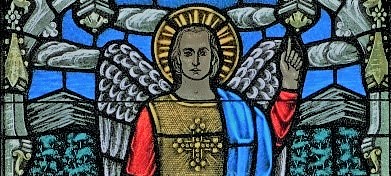Ten lepers healed … but only one faithful!
Father Pothin's Reflection for September 17, 2017
Today’s Gospel reading presents us a very special story: the healing of ten lepers who approached Jesus and prayed, ”’…Master, have mercy on us’.” Jesus, moved with pity, said to them, “Go shew yourselves unto the priests.” And as they went, they were cleansed…but only one, a stranger, came back to thank Him.
Here are some questions for our weekly reflection: Why did Jesus send them to the priests instead of healing them right there? Why had the lepers never gone to the priests before or after meeting with Jesus? What did the nine other healed men miss by not going back to Jesus with praise and thanksgiving? What message God is giving us through his holy Gospel?
Jesus said to the lepers, “Go shew yourselves unto the priests.” According to the ancient Jewish law (cf. Lv 13-14), leprosy was not only considered a disease but also the most serious consequence of impurity. It was the priests’ duty to diagnose it and to declare unclean the sick person, in order that he be isolated from the community until his eventual and well-certified recovery. Thus, leprosy constituted a kind of religious and civil death, and its healing a kind of resurrection.
It is possible to see leprosy as a symbol of sin, which is the true impurity of heart that does distance us from God. It is not in fact the physical disease of leprosy that separates us from God as the ancient norms taught, but sin– spiritual and moral evil. This is why the Psalmist exclaims: “Blessed is he whose fault is taken away,/whose sin is covered”, and then says, addressing God: “I acknowledged my sin to you,/my guilt I covered not./I said, ‘I confess my faults to the Lord’ /and you took away the guilt of my sin.” (Ps 32[31]: 1, 5).
The sins that we commit distance us from God and, if we do not humbly confess them, trusting in the divine mercy, they will finally bring about the death of the soul. This miracle thus has a strong symbolic value. Jesus, as Isaiah had prophesied, is the Servant of the Lord who “has borne our griefs/and carried our sorrows.” (Is 53: 4). In Christ’s Passion, He became as a leper, made impure by our sins, separated from God: he did all this out of love, to obtain for us reconciliation, forgiveness and salvation. In the Sacrament of Penance, the crucified and risen Christ purifies us through His priests with His infinite mercy. He restores us into communion with the Heavenly Father and with our brethren, and makes us a gift of His love, His joy, and His peace.
When was the last time you followed your Savior’s command to “Go shew yourselves unto the priests”? And went back to Him with praise and thanksgiving? What keeps you from doing so?
Father Pothin


